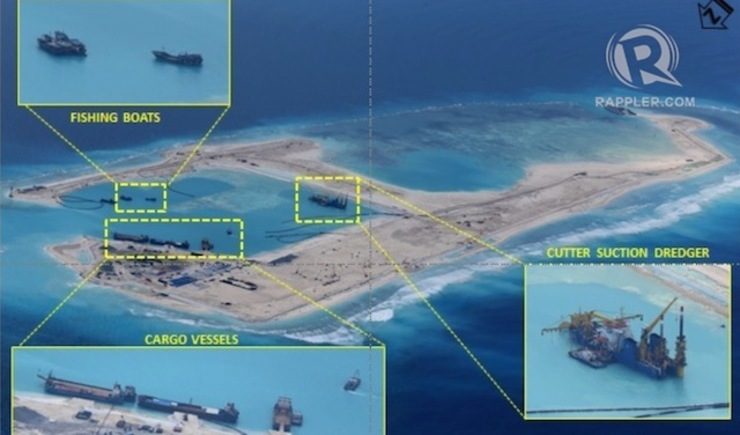SUMMARY
This is AI generated summarization, which may have errors. For context, always refer to the full article.

There is a growing consensus that the next global conflict will be staged in South China Sea between two major powers – China and the United States of America. If ever these big boys feud for the coveted maritime chokepoint, it would represent the conflict of The Great Game that the novelist Rudyard Kipling alluded to in his 1901 novel Kim between Russia and Britain in Central Asia. I am not so sure if the current game is a rerun.
With smaller and weaker littoral claimant states (i.e., Philippines, Vietnam, Malaysia, Brunei, and Taiwan) morally or legally making their ill-feelings known to the world from being harassed by an oversized bully, the major players in the region such as the United States and Japan, who are allegedly sympathetic to their respective cries for justice and protection, may have whispered promises of support in the vast disputed territory without actually sticking their necks out in a manner resembling the gunfight at the OK Corral.
Strategic asymmetry
And why is that? Well, because of its asymmetry. That is, the feud produces mutable, measured, and uncertain prolonged outcomes with no resolution in sight.
For example, in the absence of a credible and swift retaliatory action against the bully, the affected kids are encouraged to simply sing the campfire’s “Kumbaya” of self-restraint while the former is allowed to grab what it wants as a claim jumper from camp to camp, so to speak.
Or, while the major players coax affected claimants to resolve the overlapping territorial claims in a civilized fashion of international law and order, China insists it is an ancient and historic sovereignty issue. Or still, telling the US to butt out, as it is not a party to the territorial row – and to top it all, warning the US of an inevitable World War III if it does not back down from its meddling in South China Sea dispute.

China’s remarkable ingenuity of asymmetrically framing the conflict favors its superpower ambition because it is thinking long term rather than short term. There is no doubt that it is protractedly committed into this conflict for the long haul based on its fundamental strategy of grab and control.
Where does this strategy emanate? What is its foundation?
I think China’s approach is founded upon what Lao Tzu observed a long time ago. He said: “the sage transforms the world by controlling water.” While spoken about 3,000 years ago, the import of his ministerial admonition could just be as well what is now happening in our neck of the woods.
In the meantime, China is largely unstoppable as it heeds what the ancient Chinese philosopher predicted a long time ago that he who controls the water, controls the world.
The Great Wall of Sand and The Iron Curtain
Undeterred, China has implemented the step-by-step master plan of building “The Great Wall of Sand” to establish its alleged territorial claim encompassing the so-called “9-dash line.”
Reminiscent of Prime Minister Winston Churchill’s Cold War characterization of the Soviet Union’s expansionist policy as “from Stettin in the Baltic to Trieste in the Adriatic, an iron curtain has descended across the continent,” China, too, has drawn the battle lines in South China Sea buttressed by its ever-expanding wall of artificial sand counterforts.

Through this unprecedented land reclamation, China now sees the entire South China Sea, not only as a vast territorial hub ripe for the taking, but more importantly, a maritime benchmark to altering the balance of power in the world. That is, gaining and having the de facto possession and control of the most important chokepoint for maritime transit in the world.
Just imagine what South China Sea means for China. Consider the consequential advantages that come with possession and control of almost 90% of the 3.5 million square kilometer of South China Sea with its strategic islets, resource rich grounds, and waterways.
According to a 2013 report by the US Energy Information Administration, the region has an estimated oil reserves of 11 billion barrels and an estimated natural gas reserves of 266 trillion cubic feet. Needless to say, that more than half of the world’s annual merchant fleet and a third of all maritime traffic worldwide passes through this maritime chokepoint.
Indeed, the control of water will have deep political and cultural repercussions in this emerging global conflict. With China at the center stage surrounded by lesser littoral states, I am afraid to say that tragedy will befall the latter.
Unless there is a drastic change in the region’s status quo, I am not optimistic of what lies ahead for all of us. On my part, I still believe that the best way to avoid a war is to be prepared for war.
But if ever China wins in the contest, count me as one of those who will never bow down or pay homage to the new imperial waterlord. – Rappler.com
Efren Padilla is a full professor at the California State University, East Bay. His areas of specialization are urban sociology, urban planning, and social demography. During his quarter breaks, he provides pro bono planning consultancy to selected LGUs in the Philippines. You may visit his wordpress site at https://efrenpadilla.wordpress.com
Add a comment
How does this make you feel?
There are no comments yet. Add your comment to start the conversation.